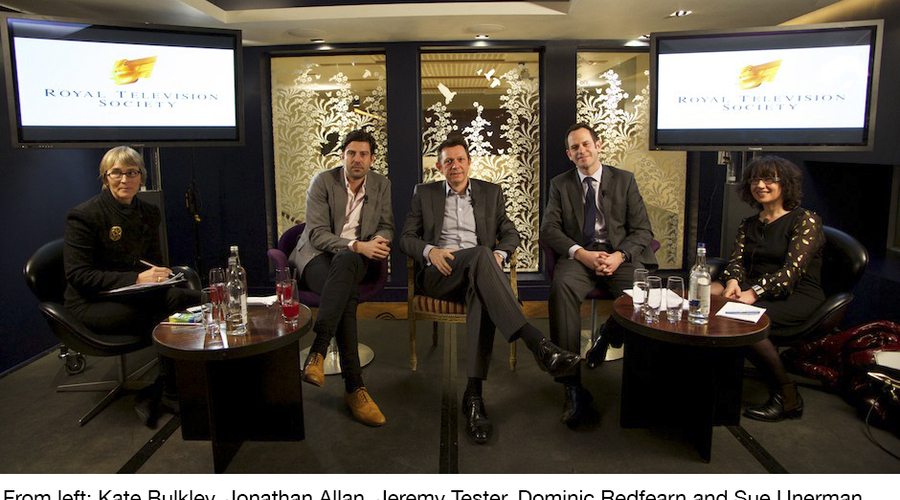Adam Crozier, David Abraham and Richard Desmond can relax – in the UK TV advertising remains very healthy despite the growth of online media.
That was the conclusion of an RTS early evening debate, “The future of advertising – Will TV still have a starring role?”, held at The Hospital Club in London on 4 February.
As panellist Jonathan Allan, Channel 4’s director of sales, said: “TV is still an amazingly powerful medium.
“It is the only medium that can grow really fast awareness, emotional engagement with a product or brand and, ultimately, long-term brand equity that lasts for years. And it sells stuff.”
But TV advertising in the age of the internet is changing. Sue Unerman, chief strategy officer at Mediacom, highlighted several ways in which traditional TV spot advertising is being challenged and is adapting to the networked world.
“It is not just about ad placement anymore,” she explained. “It’s what we call ‘super-connected partnerships’ and not just about sticking ads in programme breaks. It might be about sponsorship or related content deals.”
Unerman added that today’s internet-savvy consumers demand authenticity from their advertising.
“The consumer is not a moron, but an expert with a smart phone,” stressed the strategist.
With the power of the internet at their fingertips, consumers can discover more about a product more quickly than the product’s marketing department.
Another trend Unerman identified is the personalisation of advertising driven by the kind of data collection that enabled Sky to launch its new, targeted ad initiative, AdSmart.
Jeremy Tester, director of brand strategy and communications at Sky Media, recalled that AdSmart was long in the gestation – James Murdoch had apparently first mentioned it back in 2008. But following a period of beta testing last year the service is finally up and running.
“Hopefully, when you think about Sky, you think about innovation. That’s been in our DNA for 25 years,” he said.
“Here we are going into the latest phase of that in the advertising division, with AdSmart and our colleagues in Sky IQ.”
By placing targeted ads, identified by post codes and demographic groups, on the hard drives of Sky Plus boxes, the idea involves persuading advertisers new to TV to come on board.
“The size of the prize… runs into billions,” said Tester. “It’s all the advertisers who are currently using other media to achieve their goals. They might be in local radio or local press.”
Dominic Redfearn, global media and content director at drinks giant Diageo, (whose Guinness ads are legendary), agreed that TV advertising is changing in the digital era.
He admitted to being obsessed with how to take advantage of the opportunities created by search functions, especially on mobile devices.
Yet even Redfearn acknowledged that the power of traditional TV spot advertising remains vital to advertisers.
“TV is still a hugely important part of what we do. TV gives you reach,” he said. “It’s as simple as that. It’s a really cost-effective way to bring reach.”
A full report of “The future of advertising – Will TV still have a starring role?” will be published in the March edition of Television. The producer of the session was Channel 5’s head of corporate and regulatory affairs, Martin Stott. The session was chaired by Kate Bulkley, journalist and media commentator.
Report by Steve Clarke

